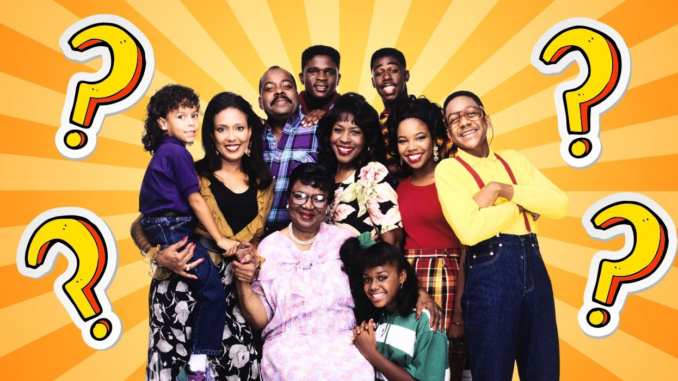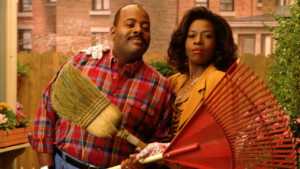
When you think of iconic 90s sitcoms, Family Matters might not be the first show that comes to mind. But Jaleel White, the actor who brought Steve Urkel to life, argues that it should be. In a recent interview, White shared his thoughts on why Family Matters didn’t get the credit it deserved and how Black sitcoms often face the challenge of being overlooked unless they fit into a specific mold. According to him, “If it’s not a hood story, it’s not a Black story.” But what does this really mean? Is this just a reflection of the entertainment industry’s biases, or is there more to the story of Family Matters than meets the eye?
In this article, we will explore Jaleel White’s comments, the impact of Family Matters on Black television, and why it’s time to rethink the narrative surrounding Black sitcoms.
The Rise of Family Matters: A Show Ahead of Its Time
Family Matters, which aired from 1989 to 1998, was a groundbreaking show in many ways. Set in a middle-class Black family living in Chicago, the show was a perfect mix of humor, heart, and life lessons. But what truly set it apart was its ability to break stereotypes and portray Black families in a light that hadn’t been done before.
Unlike the many “hood” stories that were prevalent in media during the 90s, Family Matters showed Black people living in suburban areas, with careers, aspirations, and everyday struggles. The show introduced audiences to Steve Urkel, the nerdy yet lovable neighbor who became an instant pop culture icon. However, despite its success and impact, Family Matters did not receive the same level of recognition as other shows of its era.
Breaking Stereotypes: Black Families Beyond the Hood
One of the main reasons Family Matters was so revolutionary was its portrayal of Black life in a way that was rarely seen on TV. The show didn’t fall into the stereotypical portrayal of Black characters living in poverty or surrounded by crime. Instead, the Winslow family was composed of middle-class professionals, making it a rare and refreshing take on Black life in America.
However, as Jaleel White points out, the entertainment industry often overlooks shows like Family Matters because they don’t fit the narrative of what a Black story “should” be. The industry tends to gravitate toward “hood” stories or those focused on struggles with systemic issues, leaving shows like Family Matters without the recognition they deserve.

The Hollywood Double Standard: Why “Hood” Stories Get More Attention
Jaleel White’s comment that “if it’s not a hood story, it’s not a Black story” points to a deeper issue in Hollywood. For decades, the industry has focused on certain types of Black stories—those that fit into the “struggle narrative” of poverty, crime, and hardship. While these stories are important and valid, they often overshadow other types of stories that reflect a broader range of Black experiences.
Shows like Family Matters, The Cosby Show, and A Different World offered a different perspective—one where Black families could be successful, happy, and well-adjusted. These shows didn’t focus on the typical issues that were often associated with Black communities in mainstream media, but rather celebrated Black excellence, love, and everyday life.
However, because these shows didn’t fit into the more “gritty” or “realistic” depiction of Black life, they often weren’t considered “authentically” Black by certain critics and media outlets. This reflects a larger issue of tokenism and limited representation in Hollywood, where Black stories that challenge stereotypes are often dismissed or overlooked.
Jaleel White’s Impact as Steve Urkel
Steve Urkel is one of the most beloved characters in TV history. His catchphrase “Did I do that?” became iconic, and his nerdy, over-the-top personality made him a fan favorite. But beyond the laughs, Urkel was a representation of something different—a Black character who didn’t fit the mold of the typical sitcom hero.
Jaleel White’s portrayal of Urkel challenged the standard tropes of Black characters on TV. He wasn’t the “cool” guy; he wasn’t the athlete or the gangster. He was a science geek, a quirky and socially awkward teenager, which was a refreshing change from the typical roles Black actors were offered at the time.
White’s role as Urkel was groundbreaking because it allowed Black audiences to see a different type of Black character on screen. It also allowed White to showcase his range as an actor, shifting from the nerdy Urkel to the cool, suave Stefan Urquelle—highlighting that Black people, like everyone else, can embody a range of personalities and traits.
The Overlooked Legacy of Family Matters in Pop Culture
Despite its massive popularity, Family Matters didn’t get the recognition it deserved in the broader conversation about Black sitcoms. Shows like The Fresh Prince of Bel-Air and Martin are often hailed as the ultimate Black sitcoms of the 90s, while Family Matters is often left out of the conversation.
This oversight can be attributed to several factors, including the show’s portrayal of Black people outside of the stereotypical narrative. While The Fresh Prince and Martin were both excellent shows that focused on Black characters, they often leaned into the cultural norms of “coolness” or the “hood” experience. Family Matters, on the other hand, had a broader appeal and didn’t adhere to these conventions, which may have contributed to its lack of recognition within the industry.
Reclaiming Family Matters as a Pioneering Black Sitcom
In recent years, there has been a growing recognition of the impact Family Matters had on Black television. Shows like Black-ish and The Neighborhood have followed in its footsteps, depicting Black families in positive, middle-class environments. But even with these newer shows, Family Matters’ legacy often remains overlooked.
Jaleel White’s comments shed light on the industry’s tendency to overlook Black sitcoms that don’t fit into a certain mold. It’s time for Family Matters to be recognized for what it truly was: a pioneering show that brought a new, more inclusive perspective to Black representation on television.
The Future of Black Sitcoms: Moving Beyond the “Hood” Narrative
As the conversation around Black representation continues to evolve, it’s crucial to remember the importance of diverse narratives. Black sitcoms should be allowed to tell stories that go beyond the stereotypical portrayal of Black life. There is room for stories about Black success, love, and happiness, just as there is room for stories about struggle and adversity.
Jaleel White’s comments are a call to action for the entertainment industry to expand its definition of what constitutes a “Black story.” It’s time to move beyond the narrow confines of the “hood” narrative and embrace the full spectrum of Black experiences.
Conclusion: A Call for Recognition
Jaleel White’s remarks on Family Matters highlight a broader issue in Hollywood—the tendency to overlook Black sitcoms that don’t fit into the “hood” narrative. Family Matters was a groundbreaking show that offered a fresh perspective on Black life in America. It’s time for the show to be recognized for the trailblazer it was, and for Hollywood to embrace a more inclusive representation of Black life.
As we continue to see a more diverse range of stories in the entertainment industry, let’s remember the importance of shows like Family Matters and the legacy they’ve left in paving the way for future Black sitcoms. It’s time to rewrite the narrative, one sitcom at a time.
FAQs
1. Why was Family Matters overlooked despite its popularity?
Family Matters was often overlooked because it didn’t fit the traditional narrative of Black sitcoms at the time, which typically focused on “hood” stories or urban struggles. The show’s middle-class, suburban setting was seen as outside the typical depiction of Black life in media.
2. How did Jaleel White’s portrayal of Steve Urkel impact TV?
Jaleel White’s portrayal of Steve Urkel broke stereotypes by showing a Black character who was nerdy and socially awkward. Urkel’s unique personality allowed Black audiences to see a different kind of Black character, challenging the typical roles that Black actors were often given.
3. What is the significance of Family Matters in terms of Black representation on TV?
Family Matters was significant because it showed a positive and successful Black family in a suburban setting, which was rare at the time. It helped to expand the narrative of Black life on TV, showcasing a broader range of Black experiences beyond the stereotypical struggles of poverty or crime.
